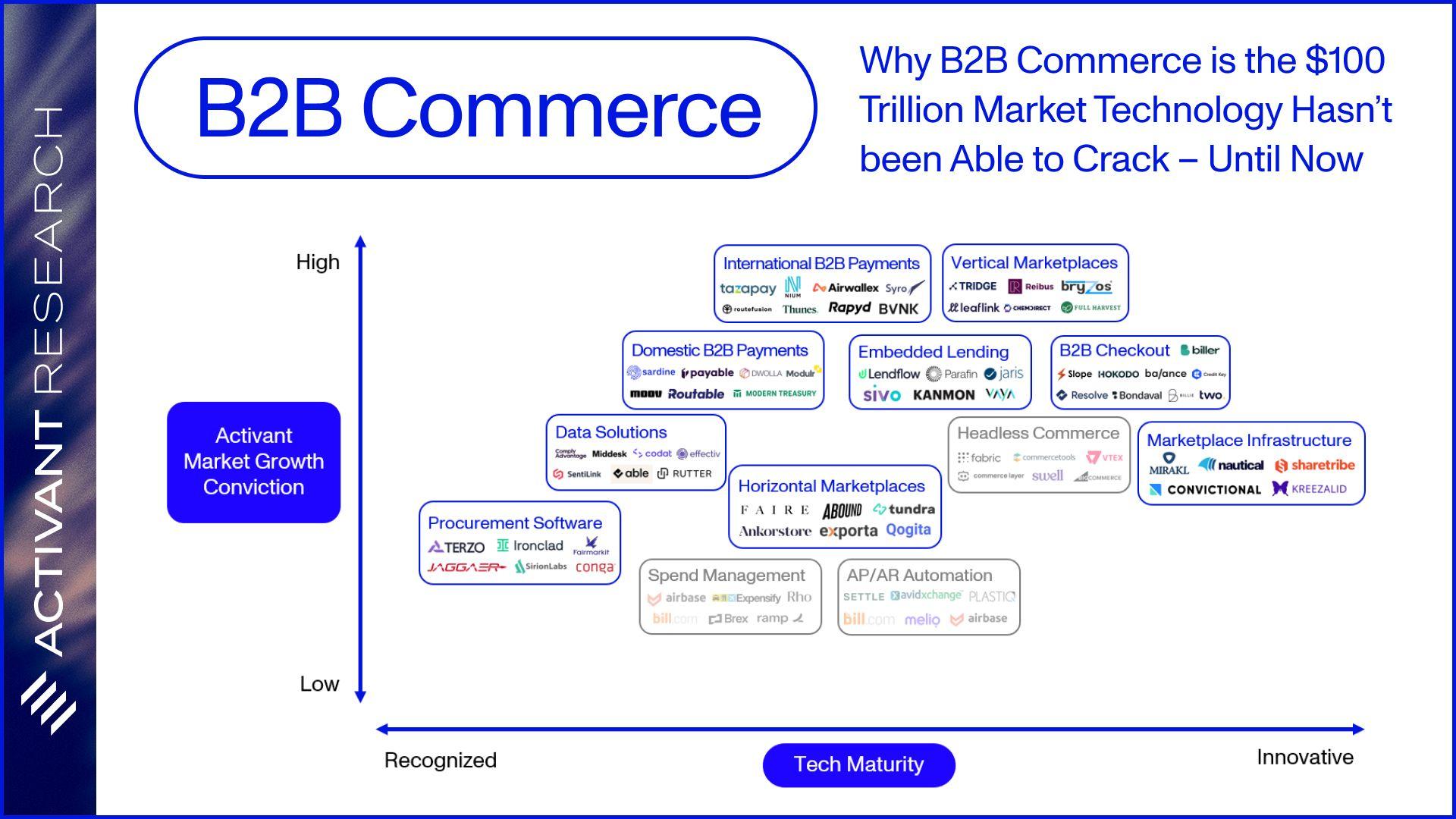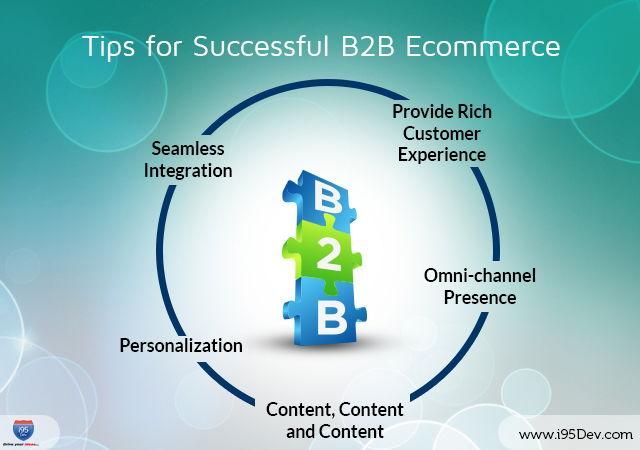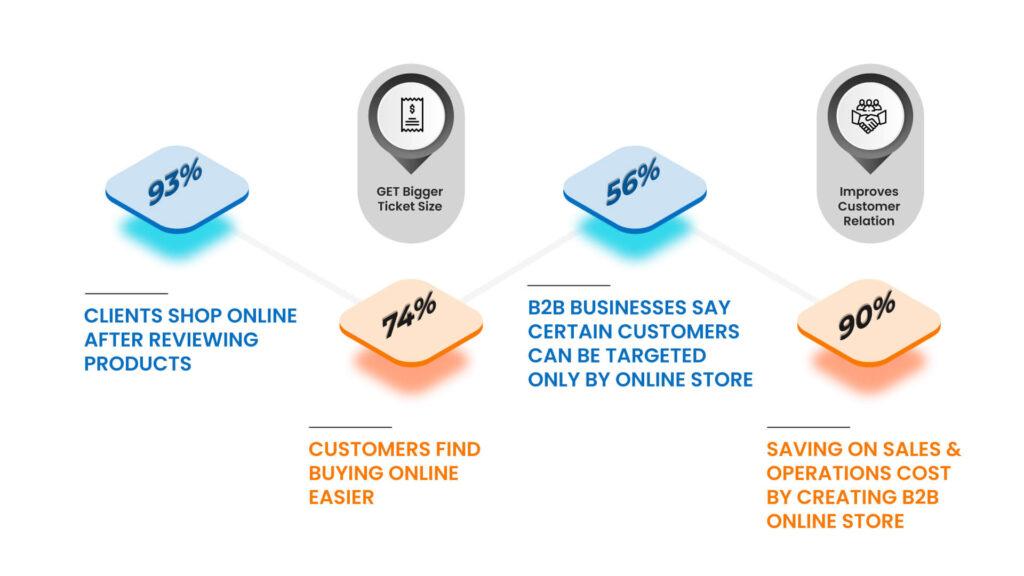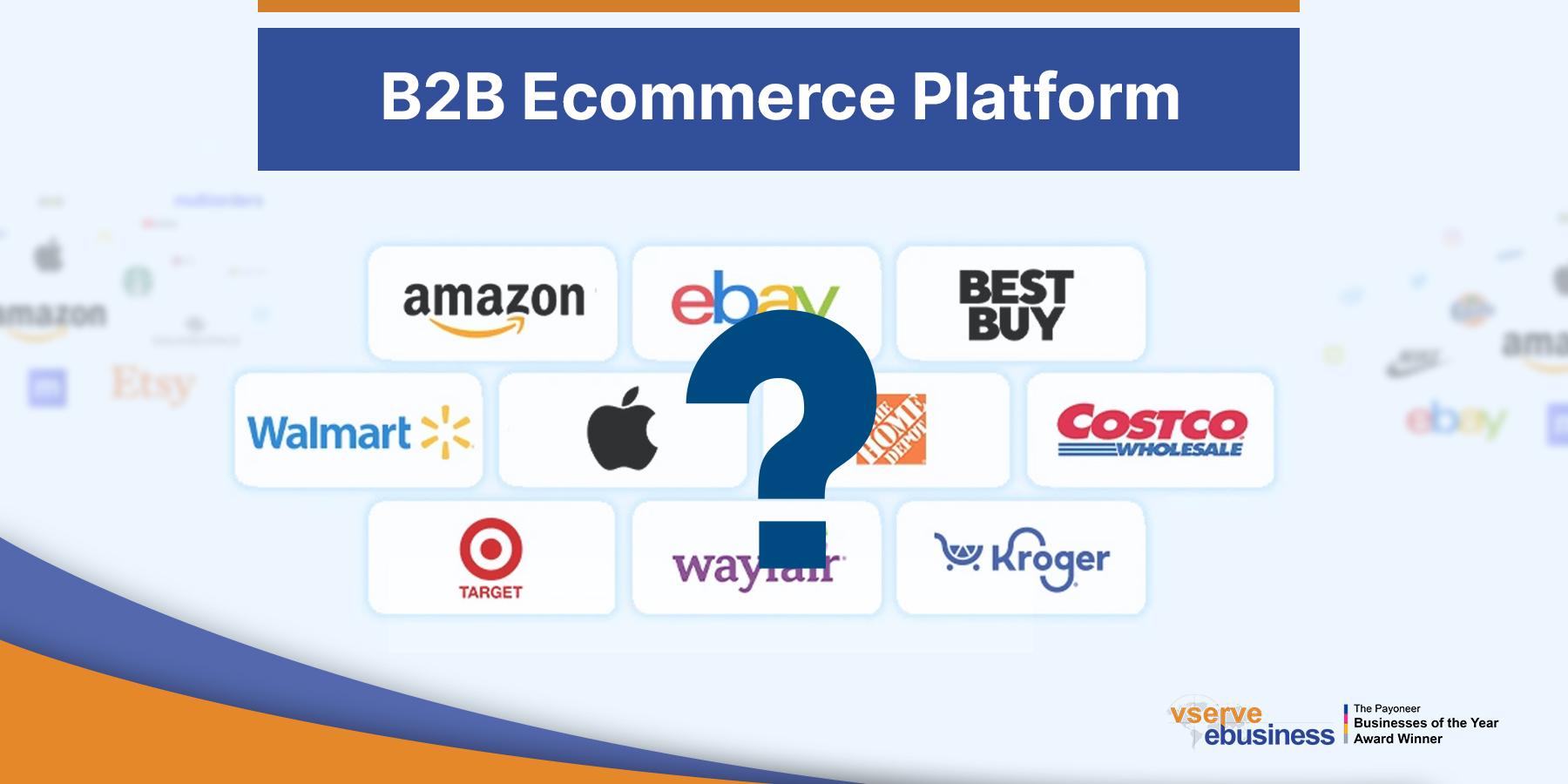In the fast-paced world of business, the right tools can make all the difference. If you’re in the B2B sector, you know that the landscape is constantly evolving, and staying ahead of the curve is crucial for success. Enter B2B commerce platforms—your secret weapon to unlocking new revenue streams and enhancing customer relationships. Whether you’re a seasoned pro or just starting out, choosing the right platform can be overwhelming with so many options available.But fear not! In this article, we’ll break down the 8 best B2B commerce platforms that not only cater to your unique business needs but also empower you to reach new heights. Get ready to transform your approach and discover how the right platform can supercharge your growth and elevate your brand to the next level!
Exploring the Landscape of B2B Commerce Platforms
As the digital landscape continues to evolve, businesses are increasingly recognizing the need for robust B2B commerce platforms that can facilitate seamless transactions and enhance customer relationships. These platforms are essential for organizations looking to streamline processes, improve operational efficiency, and ultimately drive revenue. With numerous options available, it’s crucial to understand what makes a B2B commerce platform stand out.
When evaluating different platforms, consider the following key features that can substantially impact your business:
- User Experience: A platform that offers intuitive navigation and a clean interface can drastically improve customer satisfaction and retention.
- Integration Capabilities: The ability to integrate with existing systems such as ERPs and CRMs ensures a smoother operational flow and reduces data silos.
- Customization Options: Tailoring the platform to meet your specific business needs can enhance functionality and better serve your target market.
- Scalability: As your business grows, the platform shoudl be able to scale with you, accommodating increased transactions and customer demands.
- Security features: Protecting sensitive business data is paramount; thus, robust security measures should be a non-negotiable aspect of any platform.
Equally critically important is the level of support provided by the platform vendor. A responsive customer support team can help troubleshoot issues quickly, allowing you to maintain operational continuity. Look for vendors who offer extensive resources, including knowledge bases, community forums, and training sessions, to empower your staff and enhance platform utilization.
Pricing models can also vary widely among B2B platforms, so it’s essential to analyze the total cost of ownership.Some platforms may boast lower upfront costs but coudl lead to higher expenses down the line due to transaction fees or limited functionality.Be sure to weigh the benefits against the costs to determine the best value for your organization.
| Platform | Key feature | Price Range |
|---|---|---|
| Shopify Plus | Customizable Checkout | $$$ |
| BigCommerce | Built-in SEO Tools | $$ |
| Magento | open Source Flexibility | $$$ |
| Salesforce Commerce Cloud | AI-Powered Insights | $$$$ |
| OroCommerce | Targeted Marketing Tools | $$ |
choosing the right B2B commerce platform requires careful consideration of various factors, including functionality, cost, and support. By investing in a platform that aligns with your business needs,you can unlock new revenue streams and position your organization for lasting growth in the competitive B2B landscape.

How the Right Platform Can Transform Your Revenue Streams
Choosing the right B2B commerce platform can be a gamechanger for businesses looking to enhance their revenue streams. A well-suited platform not only boosts operational efficiency but also streamlines the customer experience, making it easier for clients to engage and transact. With the right tools at your disposal, you can create a seamless buying journey that encourages repeat business and upselling opportunities.
Consider the following benefits of selecting the ideal platform:
- Enhanced User Experience: A user-friendly interface can significantly improve customer satisfaction. when clients can navigate effortlessly, they’re more likely to complete their purchases.
- Integration Capabilities: The ability to integrate with existing tools and systems allows for better data utilization, making it easier to track customer behavior and preferences.
- Scalability: A robust platform can grow with your business, accommodating increasing transaction volumes and expanding product offerings without compromising performance.
- Advanced Analytics: Utilize detailed analytics to gain insights into sales trends and customer preferences, enabling data-driven decision-making that can drive revenue growth.
By investing in the right platform, businesses can also tap into new revenue channels. As a notable example, many B2B platforms now offer features like subscription models, which create predictable revenue streams and foster long-term customer relationships. Additionally, implementing advanced payment options can cater to diverse client needs, making your business more accessible.
To give you a clearer picture, here’s a fast comparison table of some top B2B commerce platforms:
| Platform | Key Features | Ideal For |
|---|---|---|
| Shopify Plus | Custom storefronts, multi-channel selling | Growing businesses |
| BigCommerce | Built-in SEO tools, advanced analytics | Mid-sized enterprises |
| Magento | Highly customizable, extensive integrations | Large corporations |
| Salesforce Commerce Cloud | AI-driven insights, seamless integration | salesforce users |
Ultimately, the right B2B commerce platform can propel your business by unlocking new revenue opportunities and enhancing customer loyalty. It’s time to explore how these platforms can work for you and redefine your sales potential.
Key Features to Look for in a B2B Commerce Solution
When choosing a B2B commerce solution, several key features can significantly enhance your business operations and customer experience. These essential capabilities not only streamline processes but also ensure that your platform remains competitive in an ever-evolving digital landscape.
customization and Scalability are paramount. Your chosen platform should allow for tailored solutions that meet the unique needs of your business. Look for options that enable you to adjust product catalogs, workflows, and pricing structures easily as your business grows. This adaptability ensures that you can cater to varying customer demands without undergoing a complete system overhaul.
Robust Analytics and Reporting tools are another must-have.The ability to track sales trends, customer behavior, and inventory levels empowers businesses to make informed decisions. A platform with advanced data visualization can help you identify opportunities for upselling and cross-selling, ultimately driving revenue growth.
Integration capabilities are critical as well. A top-tier B2B commerce solution should seamlessly connect with other business systems such as CRM, ERP, and marketing automation tools. This integration not only enhances operational efficiency but also provides a unified view of customer interactions,contributing to a more personalized shopping experience.
Lastly, consider the customer support and resources offered by the platform. having access to a dedicated support team and extensive documentation can significantly ease the transition and ongoing management of your B2B commerce site. Look for platforms that provide training resources, community support, and responsive customer service to ensure you’re never left in the lurch.
| Feature | Importance |
|---|---|
| Customization & Scalability | Adapt to unique needs and grow efficiently. |
| Analytics & Reporting | Make data-driven decisions for increased sales. |
| Integration Capabilities | Streamline operations and unify customer data. |
| Customer Support | Access to resources ensures smooth operations. |
Top Platforms That Are revolutionizing B2B Sales
In the fast-paced world of B2B sales, conventional methods are being challenged as innovative platforms emerge to streamline processes and enhance customer experiences. These platforms not only facilitate transactions but also foster stronger relationships between businesses. Here’s a look at some of the key players changing the landscape of B2B commerce.
1. Shopify Plus: As a powerhouse in the e-commerce space, Shopify Plus offers robust features tailored for large enterprises. Its user-friendly interface, combined with powerful APIs, allows businesses to customize their storefronts and automate processes. With an extensive app ecosystem, Shopify Plus is perfect for businesses looking to scale operations without compromising on efficiency.
2. Magento Commerce: Known for its flexibility, Magento Commerce provides a complete solution for B2B businesses. Its customizable architecture allows companies to create unique buyer experiences. Additionally, features like customer segmentation and personalized pricing empower sellers to target specific audiences effectively.
3. BigCommerce B2B Edition: This platform is designed with wholesale needs in mind. BigCommerce B2B Edition offers advanced functionalities such as bulk pricing and customer groups, making it a go-to choice for businesses dealing with larger orders. Its powerful SEO tools also ensure that your products are easily discoverable online.
4. WooCommerce: For those already using WordPress, WooCommerce is an excellent addition. This plugin transforms websites into fully functional e-commerce stores, allowing B2B companies to sell directly from their sites. With a plethora of extensions available, WooCommerce can be tailored to meet the unique needs of any business.
| Platform | Key Features | Ideal For |
|---|---|---|
| Shopify plus | Custom storefronts, Automation | Large Enterprises |
| Magento Commerce | Flexibility, Customization | Medium to Large Businesses |
| BigCommerce B2B | bulk Pricing, Customer Groups | Wholesale Sellers |
| WooCommerce | Integration with WordPress, extensions | small to Medium Businesses |
As businesses increasingly shift their focus to digital solutions, selecting the right platform becomes paramount. Each of these platforms brings unique strengths to the table, catering to various business needs. By leveraging these innovative platforms, companies can not only enhance their sales processes but also unlock new revenue streams and drive growth in today’s competitive market.

Success Stories: Companies Thriving with B2B Commerce Tools

Navigating the Integration Challenges with B2B Solutions
In today’s rapidly evolving digital landscape, businesses are increasingly embracing B2B commerce platforms to streamline operations and elevate revenue potential. However, the integration of these robust solutions can present a range of challenges that demand strategic planning and execution.Understanding these hurdles is the first step toward effective navigation.
One of the primary challenges businesses face is the incompatibility of existing systems with new B2B solutions. Legacy software often fails to communicate effectively with modern platforms, leading to data silos and inefficiencies. To overcome this, companies must invest in thorough pre-integration assessments to identify potential conflicts and ensure that data flows seamlessly between systems.
Another significant factor is the change management aspect. Employees may resist adopting new tools due to fear of the unknown or a lack of training. It’s crucial to foster a culture of openness and continuous learning where team members feel supported throughout the transition. Implementing comprehensive training programs can facilitate smoother onboarding and encourage a proactive approach to utilizing these platforms.
Moreover, businesses should consider the scalability of their chosen B2B solutions. As market demands evolve,so too must the platforms that support them. Opting for a solution that can easily adapt to increasing transaction volumes or expanded product lines is vital. This foresight not only minimizes future integration challenges but also enhances long-term profitability.
| Challenge | Solution |
|---|---|
| Incompatibility | Conduct pre-integration assessments. |
| Change Management | Implement comprehensive training programs. |
| Scalability | Choose adaptable solutions for future growth. |
Lastly, fostering strong partnerships with B2B solution providers can dramatically ease the integration process. By collaborating closely with vendors, businesses can gain insights into best practices and leverage additional resources that may be necessary for a triumphant launch. This collaborative approach not only streamlines the integration process but also sets the stage for ongoing support and innovation.

Maximizing Customer Engagement through B2B Platforms
In today’s digital landscape, customer engagement is no longer just a trend; it’s a necessity for B2B success.Leveraging the right platforms can create opportunities to strengthen relationships with clients and drive revenue growth. By using advanced B2B commerce platforms, businesses can cultivate stronger connections with their customers while providing tailored experiences that enhance satisfaction and loyalty.
One of the moast powerful aspects of B2B platforms is their ability to personalize the customer journey. By utilizing data analytics, businesses can understand buyer behavior and preferences, enabling them to deliver targeted content and offers. Here’s how you can maximize customer engagement:
- Tailored Communications: Utilize customer data to send personalized emails and offers based on previous purchases and browsing behaviors.
- Interactive Content: Engage your audience with webinars, case studies, and interactive tools that address their pain points and help them make informed decisions.
- Responsive Customer Support: Implement chatbots and instant support features to provide quick responses to inquiries, enhancing customer satisfaction.
Moreover, integrating social proof and community features can significantly boost engagement. By showcasing testimonials, reviews, and case studies, you can build trust and validate your offerings. Additionally, creating a community forum or user group fosters collaboration and knowledge sharing among customers, which can lead to increased loyalty and repeat business.
To illustrate the impact of these strategies, consider the following table that compares different B2B commerce platforms and their engagement features:
| Platform | Personalization | Analytics | Community Features |
|---|---|---|---|
| Platform A | Advanced | Real-time | yes |
| Platform B | Moderate | Basic | No |
| Platform C | Extensive | Comprehensive | Yes |
investing in these features not only enhances customer engagement but also encourages a higher lifetime value for your clients. By fostering a deeper connection with your audience through B2B platforms, you unlock the potential for sustainable revenue growth and a thriving business ecosystem.

Future Trends in B2B Commerce You Can’t Afford to Ignore
B2B commerce is evolving rapidly, driven by technological advancements and changing buyer expectations. Companies that stay ahead of these trends will not only enhance their competitive edge but also unlock new revenue streams. Here are some key trends you should pay attention to:
- Personalization: Buyers are expecting tailored experiences similar to what they encounter in B2C transactions. Leveraging data analytics can help businesses create personalized offerings, optimizing customer journeys for increased sales.
- AI and Machine Learning: Advanced algorithms are transforming how businesses engage with customers. From predictive analytics to automated customer service solutions, AI can enhance operational efficiency and improve decision-making.
- Mobile Commerce: With the rise of mobile device usage,having a mobile-optimized platform is no longer optional. A responsive design not only enhances user experience but also facilitates seamless transactions on-the-go.
- subscription Models: More B2B companies are adopting subscription-based services. This trend allows for predictable revenue streams while fostering long-term customer relationships through continuous value delivery.
- Social Commerce: platforms like LinkedIn are becoming critical for B2B transactions. Social selling strategies can expand reach and promote brand visibility,leading to more leads and conversions.
Additionally, integrating omnichannel strategies is essential for providing a cohesive customer experience. Buyers are interacting with brands through various touchpoints, and ensuring consistent messaging and service across all channels will enhance loyalty and trust.
To visualize these transformative shifts, consider the following table, which outlines the potential impacts of these trends:
| Trend | Impact on B2B Commerce |
|---|---|
| Personalization | Increased customer engagement and satisfaction |
| AI and Machine learning | Enhanced efficiency and data-driven decision making |
| Mobile Commerce | Improved accessibility and convenience for buyers |
| Subscription Models | Stable revenue and deeper customer relationships |
| Social Commerce | Broader audience reach and higher conversion rates |
Embracing these trends is not just about keeping up; it’s about leading the charge into the future of B2B commerce. Companies that actively adopt these practices will find themselves at the forefront of their industries, equipped to meet evolving customer demands and capitalize on new market opportunities.

Choosing the Right Fit: A Quick Guide for Businesses
When selecting a B2B commerce platform, it’s essential to consider your business’s unique needs and objectives. Not every platform is created equal, and the right choice can significantly impact your revenue potential.Here’s a quick guide to help you navigate through the options:
Scalability is crucial for businesses that anticipate growth. look for platforms that can easily adapt as your business scales. This means considering flexibility in features, user capacity, and integration capabilities with other tools you may use.
User Experience should not be underestimated.Both your team and your customers will interact with the platform, so an intuitive interface can enhance efficiency and satisfaction. Pay attention to the platform’s design, usability, and how easily it can accommodate your business processes.
Another critically important factor is Integration Capabilities. Your new platform should seamlessly integrate with existing systems like CRMs, ERPs, or marketing tools. This will streamline operations and provide a holistic view of your business performance.
Consider the Support and community around the platform. A strong support system can be a lifesaver during implementation and beyond. Look for platforms that offer robust customer service, tutorials, and active user communities where you can share experiences and gather insights.
| Platform | Key Features | Best For |
|---|---|---|
| Shopify Plus | Scalability, Customization, Multi-channel Selling | Growing Businesses |
| Magento Commerce | Advanced Customization, Strong SEO | Large Enterprises |
| BigCommerce | User-friendly, Multi-channel Selling | Small to Medium Businesses |
| Salesforce Commerce Cloud | Personalization, AI Integration | Tech-savvy Companies |
don’t overlook the Cost Structure.Understand the pricing models of each platform—some may charge monthly fees, while others may have transaction fees or additional costs for premium features. Ensure the pricing aligns with your budget and expected return on investment.
By weighing these factors carefully,you can choose a B2B commerce platform that not only meets your current needs but also positions you for future growth and success.

Driving Growth: Strategies for Implementing Your B2B Platform
To truly harness the potential of your B2B platform, it’s essential to adopt a strategic approach tailored to your unique business needs. Here are some actionable strategies that can help you drive growth and maximize your revenue streams.
Understand Your Target Audience: Knowing who your customers are is the cornerstone of any successful B2B strategy. Conduct thorough market research to identify the challenges and needs of your target audience. This will enable you to tailor your platform offerings more effectively.
Leverage Data Analytics: Utilize data analytics tools to track customer behavior, preferences, and purchasing patterns. This details is invaluable for refining your product offerings and enhancing the overall user experience on your platform. Insights derived from data can guide your marketing strategies and product development.
Optimize the User Experience: A seamless user experience can significantly impact your conversion rates.Invest in intuitive design, fast loading times, and mobile compatibility. Ensure that your platform is easy to navigate, making it simple for customers to find what they need and complete purchases effortlessly.
Integrate with Existing Systems: Your B2B platform should integrate smoothly with your existing business systems such as CRM, ERP, and supply chain management tools. This not only streamlines operations but also provides a consistent experience for your customers, enhancing their satisfaction and loyalty.
Focus on Content Marketing: Developing high-quality content that addresses the pain points of your audience can position your platform as a thought leader in the industry.Consider various formats such as blogs, webinars, and case studies to engage potential clients effectively. This approach will not only build trust but also drive organic traffic to your platform.
don’t underestimate the power of feedback. Regularly solicit input from your customers and use it to make data-driven improvements. This will help you stay ahead of the competition and continuously evolve your B2B platform to meet the changing needs of your market.
Frequently Asked Questions (FAQ)
Q&A: 8 Best B2B Commerce Platforms to Unlock New Revenue
Q1: Why should businesses consider investing in a B2B commerce platform?
A1: Great question! investing in a B2B commerce platform opens the door to new revenue streams by automating and streamlining the sales process. It allows businesses to reach clients more effectively, manage orders efficiently, and provide a seamless customer experience. In today’s digital landscape, having an online presence is crucial for staying competitive and driving growth.
Q2: What are some key features to look for in a B2B commerce platform?
A2: Absolutely! When choosing a B2B commerce platform, look for features such as easy integrations with existing systems, customizable catalogs, robust payment options, and strong analytics tools. You’ll also want capabilities like customer segmentation, bulk ordering, and quote management. These features can significantly enhance your sales process and improve customer satisfaction.
Q3: Can you highlight some of the top B2B commerce platforms?
A3: Certainly! Some of the standout platforms include:
- Shopify Plus – Perfect for scaling businesses with its user-friendly interface and extensive app ecosystem.
- BigCommerce – Known for its flexibility and robust APIs, ideal for growing enterprises.
- Magento Commerce – A powerful option for those who need deep customization and control.
- Salesforce Commerce Cloud – Offers strong CRM capabilities, making it great for relationship-focused businesses.
- WooCommerce – A budget-friendly choice that integrates seamlessly with WordPress.
- Oracle CX Commerce – Best for large enterprises needing advanced features and scalability.
- SAP Commerce Cloud – Perfect for businesses looking for an enterprise-grade solution.
- OroCommerce – Specifically designed for B2B, offering unique features tailored for wholesale and distribution.
Q4: How do these platforms help unlock new revenue streams?
A4: Each of these platforms brings something unique to the table. they provide tools that enhance customer engagement,improve operational efficiency,and allow for better data-driven decision-making. As a notable example, they enable personalized marketing campaigns, which can lead to increased sales. They also facilitate new sales models, such as subscription services or bulk purchasing, which can tap into different customer segments.
Q5: What makes B2B commerce different from B2C?
A5: B2B commerce focuses on transactions between businesses, which frequently enough involve larger order volumes, more complex pricing structures, and customized services. The sales cycles tend to be longer,and relationships are a key factor. Therefore, B2B platforms must cater to these aspects by providing features like advanced quoting systems and tailored content for different business clients.Q6: How can a business measure the success of their B2B commerce platform?
A6: Measuring success can be done through several key performance indicators (KPIs). Look at metrics like sales growth, average order value, customer acquisition cost, and customer retention rates. Tracking user engagement and conversion rates on your platform can also give insights into how well you’re meeting customer needs. Regularly reviewing these metrics helps you adapt your strategy for optimal revenue generation.
Q7: Are there any common pitfalls to avoid when selecting a B2B commerce platform?
A7: Definitely! One common pitfall is choosing a platform based solely on price rather than functionality. It’s crucial to evaluate whether the platform meets your specific business needs. Additionally, neglecting to consider scalability can lead to issues as your business grows. Make sure to opt for a platform that can evolve with your business.
Q8: How can businesses get started with one of these platforms?
A8: Start by clearly defining your business goals and understanding your customer needs. Next, research the platforms mentioned and request demos to see how they function in real-time.This will allow you to assess which one aligns best with your objectives. plan for a smooth implementation process, including training your team and integrating with existing systems, to ensure a successful transition.
Q9: Any final thoughts on B2B commerce platforms?
A9: Absolutely! Embracing the right B2B commerce platform can be a game changer for your business.It’s not just about making sales; it’s about building lasting relationships with your clients and enhancing their experience. By investing wisely in these platforms, you’re not only unlocking new revenue but also paving the way for your business’s future success. Don’t wait—explore your options today!
In summary
As we wrap up our exploration of the 8 best B2B commerce platforms to unlock new revenue, it’s clear that the right choice can be a game changer for your business. From streamlined operations to enhanced customer experiences, these platforms offer the tools you need to thrive in today’s competitive landscape.
So, what are you waiting for? Take the time to evaluate your unique needs and consider how these platforms can elevate your business strategy. Remember, investing in the right technology isn’t just about keeping up; it’s about setting the pace for growth and innovation in your industry.
If you’re ready to take the plunge, don’t hesitate to reach out for demos or consultations. The future of your B2B commerce journey is shining, and with the right platform, you’ll be well on your way to unlocking new revenue streams and achieving your business goals. Happy selling!



